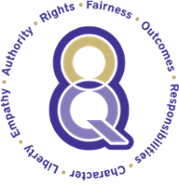Sport Doping and Ethical Reasoning Goes from Harrisonburg, Virginia to Split, Croatia
by Doug Hochstetler, Ph.D.
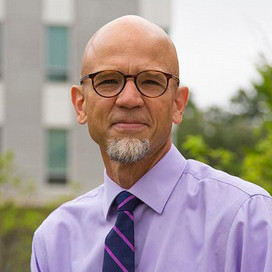
How does an interdisciplinary research project begin with an invitation? I found out when I invited Dr. Fletcher Linder, Dean of University Studies and Associate Provost for Online Strategy, to be a guest speaker for my KIN 304 class: History and Philosophy of Physical Education and Sport.
Dr. Linder spoke to the class about the value and meaning of sport through Fletcher’s lens as an anthropologist and bodybuilder. Discussions ensued about potential collaborative research projects and, after considering several possibilities, we settled on a systematic review of the sport philosophy literature regarding sport doping. The sport philosophy literature includes plenty of discussion related to sport doping, with various arguments addressing the topic. The purpose of the study was to map the ethical discourse, highlighting the most common arguments and also showing which arguments were either absent or less developed. The research method involved mapping the scholarship discourse by using the Eight Key Questions Strategy. The research process also included undergraduates as a former KIN 304 student, Jason Ball, assisted in some of the early research work. Results showed that the most common arguments focused on the Eight Key Question areas related to fairness and outcomes, while concepts such as liberty, authority, and empathy were underutilized or not mentioned at all in the literature. This September, Dr. Linder and I traveled to Split, Croatia to present a paper titled “A map of ethical discourses in doping scholarship” at the International Association for the Philosophy of Sport conference. Feedback from this presentation was very favorable and I am pleased to say we are currently revising the manuscript in preparation for submission to a peer-reviewed journal.
Wrestling With Artificial Intelligence — Using the 8KQ to Chart a Path
College of Education: Ethics, Artificial Intelligence, and Instruction
In 2023, educators are facing a new frontier: ChatGPT and generative artificial intelligence. Seeing a need to provide their pre-service teachers with best practices for using and integrating AI, faculty members from the College of Education (COE) at JMU created Guidelines for Generative Artificial Intelligence (AI) Use. The importance of this document is to not only ensure JMU COE students understand how to integrate AI into their professional work, but also pedagogically frame teaching children of all ages and abilities how to use AI correctly and appropriately. Some of the authors of this document agreed to sit down with ERiA to discuss the process, the benefits and the future of this living document.
A Note from Dr. Amy Thelk, Associate Dean of the College of Education:
My JMU College of Education colleagues and I presented at SEAC on October 3 on Exploring the Ethical Integration of AI in Education, which showcased our work group’s accomplishments so far. We were impressed with the level of audience engagement; we thought it would be best to provide targeted opportunities to participate through discussion prompts and we were thrilled that conversation flowed among everyone in the room.
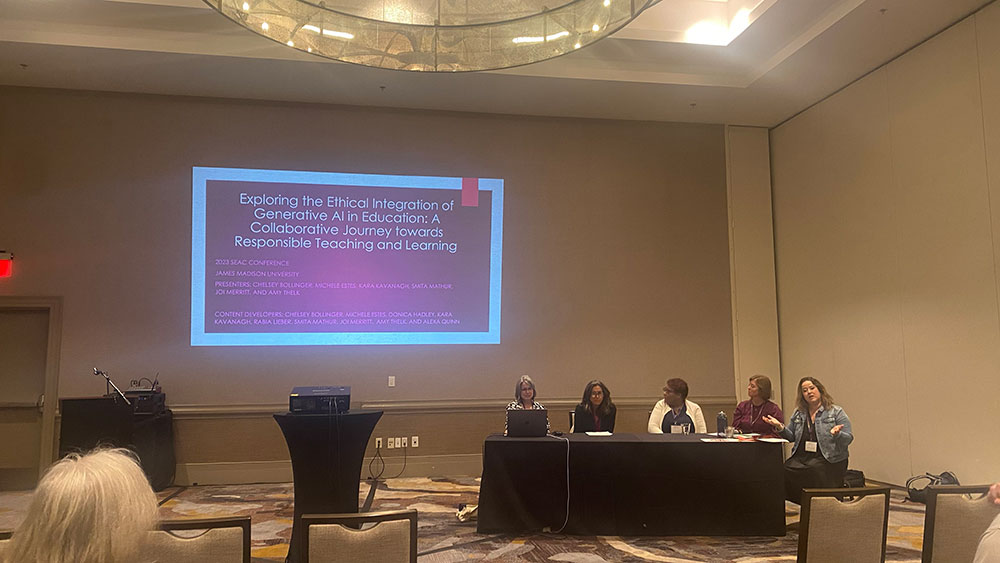
We find that there are different reactions to using AI as a learning tool. Earlier this year, the dominant thought seemed to be that AI would shortcut learning or provide a way to cheat. However, this mindset has been subsiding as educators share their ideas and innovations with each other. At the College of Education, we want each instructor to feel supported in using AI if they choose. Our guidance includes example statements to include in syllabi, links to relevant articles, and ideas for classroom activities. College leadership will revisit the guidance regularly (several times a semester) to be sure that the most recent knowledge is reflected in the narrative.
Amy Thelk, Ph.D.
Associate Dean of the College of Education
Digital Transformation: JMU Hosts Two Conferences Addressing Ethical and Social Implications of AI
by Philip L. Frana, Ph.D.

In recent weeks, Internet pioneer and venture capitalist Marc Andreessen posted two lengthy declarations of his beliefs about the positive impact of artificial intelligence (AI) on human progress. The first, “Why AI Will Save the World,” emphasized how such technologies will transform our society and economy. In the second piece, entitled “The Techno-Optimist Manifesto,” Andreessen labeled thoughtful critics as “enemies” and railed against “zombie ideas” like trust and safety, sustainability, social responsibility, and tech ethics. For this essay, he is being squeezed through the wringer of public scrutiny.
Certainly, Andreessen would have benefitted from first-person encounters with scholars and policymakers who express hopeful but wary outlooks and make it their life’s work to design just, equitable, and responsible futures for a world with AI. In late September and early October, the JMU campus was the site of two remarkable conferences aimed at facilitating just this sort of ethical and public policy discussion about the impact of AI on society. These conferences were the Gandhi Center’s Beitzel Symposium and the Society for Ethics Across the Curriculum (SEAC) Conference. Prominent experts, including emerging tech scholar David Gunkel, AI ethicist Matthew Liao, media scholar Siva Vaidhyanathan, edtech policy specialist Michael Trucano, and foresight analyst Arianna Valentini delivered keynotes at these events.
What needs to change for the world to be fair, just, and free in the Age of AI? While digital technologies have historically solved many problems, presenters at both events cautioned against assuming that radical abundance and vastly improved quality of life are automatic certainties. Indeed, many participants at both events stressed that the unbridled techno-optimism that inspires the current generation of entrepreneurs often obstructs meaningful reflection on the challenges and consequences associated with values like unbridled competition, hyper-individualism, and remorseless revenue maximization.
The Beitzel Symposium and SEAC actively anticipate concerns that our society’s innovators, policymakers, and government regulators will have to wrestle with in coming days. Software developers who have a direct role in accelerating the delivery of AI technologies in higher education, for instance, must thoughtfully contemplate a range of moral and philosophical questions concerning faculty autonomy, student agency, and other indispensable aspects of human learning. Guardrails will need to be placed on AI chatbots and conversational robots that imitate or emulate human friendship and emotional support, to ensure they do not mislead individuals or infringe upon genuine human relationships. And public officials will need to develop directives on the appropriate use of AI in governance, so that the agencies we depend upon for services meticulously evaluate model performance before use. It is heartening to see that JMU is leading the way in making room for these important conversations.
Ethical Reasoning Across Campus
This semester, ERiA delivered the Eight Key Questions ethical reasoning strategy through several guest lectures to students, faculty and staff here at JMU and beyond:
Ethical Reasoning for Everyone with Erin Phillipi (September 27, 2023)
JMU Talent Development’s annual offering invites faculty and staff at JMU to add ethical reasoning to their professional development tool belt. In this interactive workshop, participants revisit past choices and evaluate new decisions using the Eight Key Questions. Using ethical scenarios to learn and apply the 8KQ, 16 participants left this year's session with a tool that can be useful in future personal and professional decisions.
Crisis Intervention Strategies with Cannie Campbell (October 4, 2023)
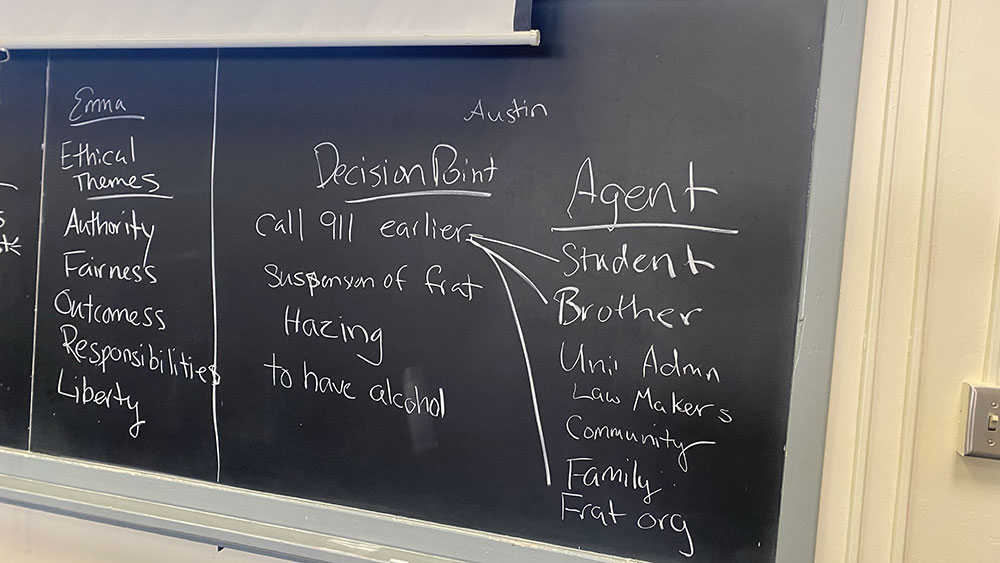
This course introduces College Student Personnel Administration candidates to the theories and techniques of crisis intervention. A semester-long project asks students to design a case study around a topic they may encounter on a college campus. ERiA taught 5 graduate students how to incorporate the 8KQ and massage their case study into a scenario for the Crisis Intervention Demonstration: a presentation asking participants to act as a consultation team to provide appropriate questions about the key issues identified in the presentation.
Navigate with Matthew Hunsberger (October 25, 2023)
JMU Talent Development’s annual offering invites faculty and staff at JMU to add ethical reasoning to their professional development tool belt. In this interactive workshop, participants revisit past choices and evaluate new decisions using the Eight Key Questions. Using ethical scenarios to learn and apply the 8KQ, 16 participants left this year's session with a tool that can be useful in future personal and professional decisions.
Health Policy Summit 2023 with the College of Health and Behavioral Sciences (November 3, 2023)
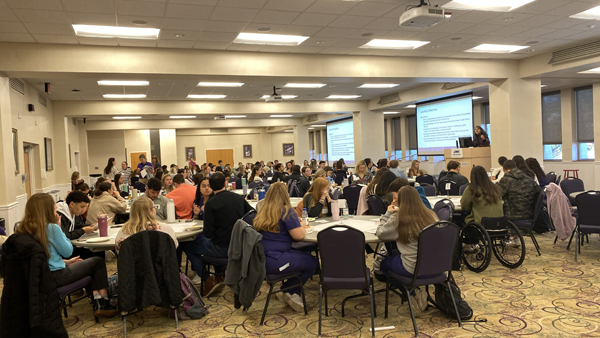
Each semester, 30 student groups collaborate to evaluate current bills before Congress related to primary, secondary or tertiary levels of opioid crisis prevention. ERiA was invited to present the Eight Key Questions as a tool to help guide their discussions on developing ethical dimensions and considerations throughout their presentations. The top three solutions are presented to legislators via a brief elevator speech. Students subsequently have an opportunity to dialogue with legislators to better understand historical context, and the strengths and weaknesses of their policy positions.
Foundations of Leadership in Sport and Recreation Management with Kathy Sarver (November 7, 2023)
JMU students in the Hospitality, Sport and Recreation Management (HSRM) industry take this course to learn leadership theory and skill application with a focus on personal awareness and ethics. The course focuses on professions in governmental, voluntary, private and commercial settings and introduces students to the 8KQ as a measurable skill to develop as they encounter ethical issues in the field.
Valley Scholars with Samuel Hernandez, ERiA Faculty Fellow (November 30th, 2023)
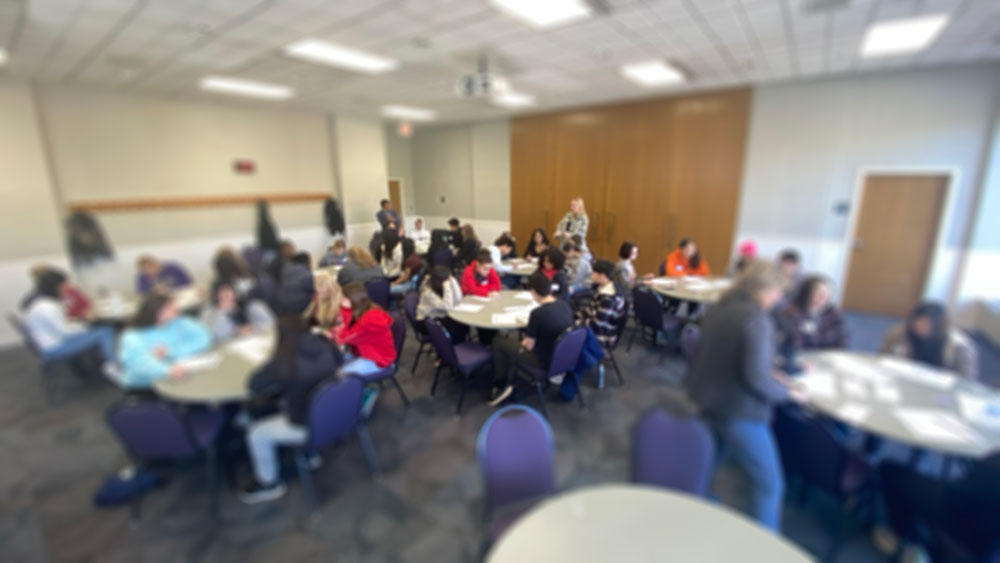
The Valley Scholars program serves first-generation, financially eligible students, who are motivated and show academic promise in middle school and throughout high school. ERiA delivered the Eight Key Questions ethical reasoning strategy to over forty 9th graders from schools across the Shenandoah Valley this semester, giving them a new skill to take back with them to help navigate the difficult decision they will encounter through high school and beyond. Image blurred to protect the identities of minors.
Ethical Reasoning Educators (October 3, November 3 and 13, 2023)
Our amazing team of student volunteer peer-educators hosted 3 lively discussions using the 8KQ ethical reasoning strategy for over 150 students this semester through wellness passport events and residence hall programming. Students engaged with scenarios ranging from topics in health care and criminal justice to everyday dilemmas encountered in their own lives.
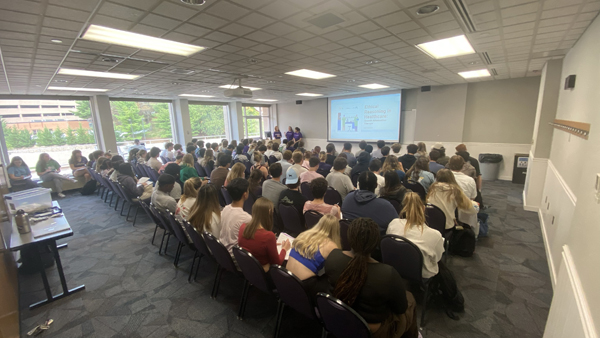
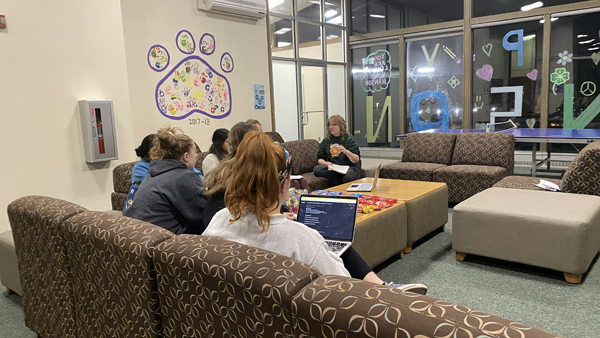
Upcoming ERiA Events
It’s Complicated Online – Classroom Edition
Are you interested in
- integrating the 8KQ into your ethics instruction?
- learning how to turn case studies into scenarios?
- understanding why you practice ethical reasoning every day?
Does your course have an ethics component, but you are in need of fresh ideas for an ethics-based classroom activity? Request a workshop with the Ethical Reasoning Educators and experience the new AI-Care scenario in the comfort of your classroom.
Be on the lookout for 8KQ professional development opportunities this spring including:
- 8KQ Core Workshops
- Scenario Writing Instruction
- Ethical Reasoning Essay Rating
Already Incorporating the Eight Key Questions? Tell us!
How are you using the 8KQ in your classes, programs, work, research, professional and daily life? Hearing your stories and, with your permission, reading them in an upcoming ERiA newsletter helps to nurture the JMU academic community into a culture where ethical reasoning flourishes!
Send your experiences, ideas, and insights to ethicalreasoning@jmu.edu.
Changes in the ERiA Office
After a national search, JMU names Dr. Christian Early as Director of Ethical Reasoning in Action. Dr. Early, a philosopher by training, looks forward to continuing the work of ERiA having served previously as both assistant and associate director.
The Class of 2027 was the first to complete JMU’s unique ethical reasoning program “It’s Complicated” virtually and the initial numbers tell a promising story! Roughly 70% of the 5,600 incoming students in the class completed It’s Complicated Online—an impressive rate for an asynchronous, self-directed canvas course. Although there are trade-offs, having students engage “It’s Complicated” through Canvas allows us to capture student interaction and use of the 8KQ strategy in ways we have not been able to do when “It’s Complicated” was delivered in-person.
Facilitators Give Away Coveted It’s Complicated T-Shirts
It’s Complicated facilitators volunteered to spend the first 6 days of the semester meeting the Class of 2027, handing out t-shirts and hearing from students about It’s Complicated Online.
“I enjoyed the opportunity to talk with students one-on-one about the Eight Key Questions, you don’t get that chance facilitating a larger group of 30 or more.” -Lisa Carmines
“I think the students were very engaged and it was great talking with them. Having staggered times over a few days gave us a chance to reach lots of different students.” -Annette Rexrode
Leaders from 11 different organizations joined a team of experts from JMU’s Center for Assessment and Research Studies and Ethical Reasoning in Action for the summer 2023 INITI8 Institute – a week-long immersion in designing learning improvement programming using the Eight Key Questions (8KQ) strategy. Representatives from JMU, Navy War College, Indiana/Purdue University, Blue Ridge Community College, University of Hawai’i, Wichita State, and the accrediting bodies of DEAC, WASCUC, SACSCOC, gathered to create actionable plans for learning improvement programs at their institutions.
Using workshop materials, participants collaborated on projects and strategized together on how to implement them at their institutions. Many left the institute feeling inspired and with a sense of confidence in their ability to teach the 8KQ, write ethical scenarios, and use assessment cycles to drive learning improvement. INITI8 2023 was such a success that institutions have already reserved their seats for INITI8 2024. If you have a team of leaders who are looking to incorporate ethical reasoning and learning improvement into their programs, contact our Improvement Strategist, Dr. Keston Fulcher, fulchekh@jmu.edu for more information.

